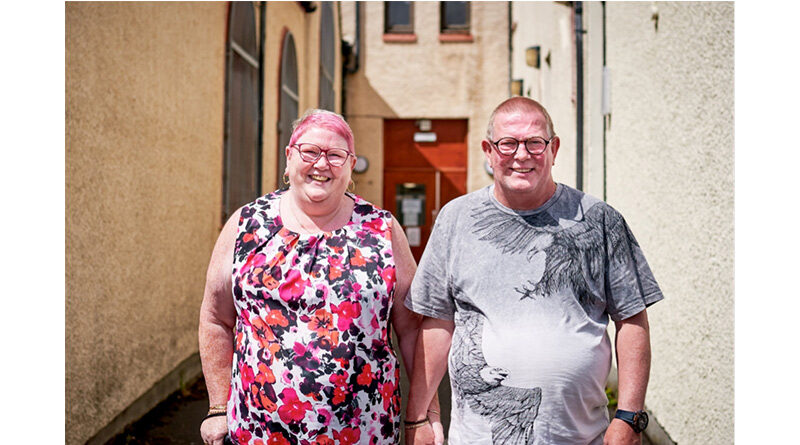Health And Social Care Workers Urged To Consider Personalised Playlists For People Living With Dementia
On World Alzheimer’s Day (today, 21 September), UK-wide charity Playlist for Life is calling for health and social care workers to learn how to swap medicine for music to support people living with dementia.
Based on decades of research on the benefits of using music, the charity is working with health and social care professionals to encourage the use of personalised playlists with residents and patients living with dementia, creating a tailored list of soundtracks with the familiar songs sparking memories from childhood through to wedding days and beyond.
Working with care homes, NHS wards and Higher Education Institutions across the UK, Playlist for Life trains health and social care teams to use music as the first line of treatment before medication.
In one care home near Glasgow, the staff reported a 60% reduction in the use of medication to calm anxiety for people living with dementia.
One couple who have benefitted from the use of Playlist for Life is Malcolm (59) and Carol (55) Topper from Carnwath. When Carol was diagnosed with young onset dementia, the pair, who have been married for 17 years, turned to their local church which runs dementia support groups and were assisted in building a personalised playlist. Malcolm cares for Carol at home and has found the playlist to be incredible in supporting Carol, which helps to stabilise her mood alongside assisting her memory.
Carol said: “After I received my diagnosis four years ago, I thought my life was over. I was in an incredibly dark place. I didn’t want to talk to anyone, I couldn’t stop crying, I didn’t want to go anywhere or do anything, I shut down emotionally.
“I was persuaded to visit the St Andrews Church group and was made to feel incredibly welcome. Straight away they introduced me to Playlist for Life and helped me pull my playlist together.
“Since then, I haven’t looked back. The difference in my overall mood is unbelievable. I’m a firm believer that the mental stimulus from recalling, not just the memories associated with a certain soundtrack, but the artist’s name and all the lyrics has really helped slow down the rate of my condition; as I can remember every song word in my playlist when it comes on, yet I struggle to remember what I had for breakfast that morning.
“As soon as my playlist is on, nothing else matters, the happiness it brings me is truly wonderful.”
Malcolm added: “Carol went into a world of her own after her diagnosis and I was trying everything to support her anyway I could. Since discovering Playlist for Life she has completely transformed.
“The whole experience has been a brilliant bonding exercise as we go through songs which bring back good times and feelings. Being a carer for someone, no matter their condition, is incredibly hard. I would urge anyone in the same position to consider looking into building their own playlist as it’s been an excellent tool, not just with helping improve Carol’s mood, but my own mood and outlook on life too. Together we’re going to keep adding tracks to our playlists, making even more memories in the process.”
Helen Skinner, Alzheimer Scotland Dementia Nurse Consultant at NHS Fife, has successfully been implementing Playlist for Life across community and mental health hospitals in the region. Helen said: “Frequently, patients who come to hospital with dementia are distressed and agitated. We try to support them as best as we can without using medication where possible, as naturally sedating with medicine poses other risks and side effects which must be considered.
“From improved moods and increased communication, through to implementing ‘therapeutic scheduling’, whereby providing the patient with music prior to a stressful activity such as taking blood, we find the music helps to relax and calm patients with no need for medication to be involved at all.
“Relatives supporting their loved ones can reconnect by identifying a playlist, helping them to feel more involved with their care whilst providing them with an engaging task to enjoy together while they’re visiting. It also allows staff to get to know patients on a deeper level, really getting to know the person rather than the diagnosis of dementia, and, as most people love listening to music, it’s an enjoyable and incredibly beneficial activity all round.”
To mark World Alzheimer’s Day, Playlists for Life is offering discounted packages on all introductory training courses for care professionals, giving them the tools to become ‘music detectives’, working with people living with dementia to map out their lives through music.
Michelle Armstrong-Surgenor, executive director of Playlist for Life, said: “Everyone has their own story to tell through the music that brings back memories from their life. This is also true for many people living with dementia, and certain songs have the ability to calm anxieties and provide comfort.
“Working with health and social care professionals in particular, we have found that personalised playlists can benefit both the person living with dementia and the care professional. Finding the musical soundtrack of someone’s life helps strengthen relationships and allows the caregiver to see the person beyond the dementia diagnosis through the music that is important to them.
“Personal playlists are a proven non-pharmacological intervention with many benefits, including the reduction of medication in some instances. We’ve had doctors actually prescribing music which is fantastic. It is our hope that we can inspire more organisations and individuals to use music in this way, allowing the 850,000 people living with dementia across the UK to benefit from the soundtrack of their life.”
For more information on the training courses or to hear more about Playlist for Life, please visit: www.playlistforlife.org.uk. Additional details can also be found on our dedicated training site: training.playlistforlife.org.uk





